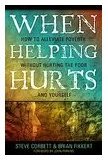August 31st, 2011 — 6:30am
To anyone paying even a little attention, it’s clear that poverty is a huge problem in the world, and even in the US. Why? What are the causes? What are the solutions? Why do so many attempted solutions seem so ineffective in practice? What can those of us who have compassion and a desire to give do to really make a difference?
I have been often perplexed by these questions, and dissatisfied with the “more for me” motives I see in many vocal participants on both conservative and liberal sides.
 Last weekend I read “When Helping Hurts: How to Alleviate Poverty Without Hurting the Poor, and Yourself” by Brian Fikkert and others authors. This book brings balance and clarity to a wide range of poverty-related issues and questions based on a consistent, sound, integrated theoretical framework.
Last weekend I read “When Helping Hurts: How to Alleviate Poverty Without Hurting the Poor, and Yourself” by Brian Fikkert and others authors. This book brings balance and clarity to a wide range of poverty-related issues and questions based on a consistent, sound, integrated theoretical framework.
There are no easy answers in this book, but there is a great deal of collected experience about what really helps, and what hurts even when well-intentioned. It’s equally applicable to poverty issues in North America and around the world. I recommend it.
August 30th, 2011 — 6:30am
One of the recent speakers at my Vistage CEO peer group said this slowly and emphatically:
People don’t listen very long.
This has been resonating in my mind ever since he said it, because it’s true, and increasingly so. Yet many meeting presenters, businesses, friends, writers, etc keep on talking long after the listeners have stopped listening. Make your point clearly, quickly, and compellingly or you’ll probably be tuned out.
This means caring more about what the listener gets to hear than about what you get to say, and that’s not easy.
August 25th, 2011 — 6:35am
The economic engine is the part where the core value add takes place. It’s the activity in the company that “pays the bills”. It’s the part of the business that creates the thing your customers come to you to get.
The organization is the collection of people and procedures and infrastructures that surround the economic engine. The organization supports the economic engine, and is also supported by it.
I think it’s very important for a CEO to be clear about what the economic engine is, and to deliberately create a lean organization that exists to maximize the output of the economic engine, while consuming as little of that output as possible to support itself. The organization is essential, the engine cannot run without it. The economic engine needs sales to deliver on, it needs accounting to monitor it, it needs all those organizational functions. But those functions should exist because, and only to the extent that, the economic engine needs them, not the other way around.
One reason I think this idea holds true is that the economic engine is inherently customer focused. It’s the part that delivers what the customer wants. When the organization is arranged to efficiently support the economic engine, the organization is arranged to do things that ultimately matter to the customer. This lean, customer-focused combination sets the stage for profitability and growth.
August 9th, 2011 — 6:00am
It’s easy to say that we should all act like startups and be willing to change everything, but it’s hard to do. It takes enormous courage and energy to upset the apple cart on purpose. Why should we be willing to do that?
There are plenty of fear- and survival-based reasons to be willing to change, but I think the big breakthrough comes when we can envision a better future. Great leaders don’t begrudgingly modify the status quo, they get excited about what’s possible around the corner, at the next level, and beyond current limitations.
Leaders wonder what’s possible, imagine a specific future, and bring it clearly into view for others. It’s easy to let go of what we’re used to when something better is clearly in view.
 Last weekend I read “When Helping Hurts: How to Alleviate Poverty Without Hurting the Poor, and Yourself” by Brian Fikkert and others authors. This book brings balance and clarity to a wide range of poverty-related issues and questions based on a consistent, sound, integrated theoretical framework.
Last weekend I read “When Helping Hurts: How to Alleviate Poverty Without Hurting the Poor, and Yourself” by Brian Fikkert and others authors. This book brings balance and clarity to a wide range of poverty-related issues and questions based on a consistent, sound, integrated theoretical framework.